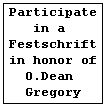
July 2003
Advice From a Fifth Grader
Diversity Conference in Western Kansas
What's Political?
Does Teacher Know Best?
Peace for the 21st Century
Achievement Profile: Rita Zeinstejer
![]()
/ Index /
/ Letters /
/ Search /
![]()
Subscribe
for free!
Cross-cultural Tensions in EFL Classrooms?
Evidence Appears on ChinaTEFL Listserv
Two recent contributions by David Kees, on the Yahoo
Groups ChinaTEFL listserv, present data about differences
between teacher and student views of the language learning
process which may be impacting the teaching practices of
EFL teachers from English-speaking countries who are
living and teaching today in China and other Asian countries.
Kees first pointed to a paper, "Discourse and Culture of Learning--Communication
Challenges," which was presented by Mingsheng Li at an AARE-NZARE
Conference in Melbourne, Australia, in 1999. The paper, available
online at www.aare.edu.au/99pap/lim99015.htm,
argues that "in transplanting Western educational models to Chinese
classrooms, [English native speaking teachers] did not sufficiently
acknowledge the cultural distance between these models and the
Chinese local sociocultural and educational realities." At Chinese
universities, explains Mingsheng Li, "the discourse of participation
was strongly resisted by Chinese students and teaching by native speakers
often failed to achieve the desired results...there existed a vast
gulf in their perceptions of what constituted 'good' teaching and
learning, of what appropriate roles they were fitted in and what
they expected of each other."
"The most controversial issue in expatriates' teaching," continues
Mingsheng Li, "is the discourse of participation which has been highly
valued, promulgated and practiced by expatriate language teachers
in China." According to Mingsheng Li, Chinese students see this
discourse as "exotic" and they "often become confused with what
the teacher expects of them in a seemingly unsupportive environment
where conversations, discussions, debates and participation become
the dominant mode of teaching."
In another ChinaTEFL posting, David Kees presented recent data
from his own action research comparing teacher and student attitudes
regarding certain classroom variables. "Knowing what teachers think
is one thing," wrote Kees. "Where the rubber meets the road is knowing
also what students think." He encouraged teachers to survey students
in order to discover their views of the learning process. Kees presented
preliminary data from his own students regarding their views on grammar,
conversation practice and error correction by the teacher.
"The big divide is the 'G' word," wrote Kees. "Grammar. Students think
it's much more important than teachers do and it's the number one
difference of opinion." It is a challenge for teachers to reconcile
this gap with current thinking on more natural approaches designed
to help students "internalize rules through developing and testing
their own hypothesis rather than explicitly studying rules." Kees
suggest that "the wise teacher will make sure students know he is not
ignoring the grammar issue," instead explaining the reasons for
his or her particular approach. "Otherwise," Kees warned, "teachers
risk causing the students to feel insecure about the quality of
training they'll be receiving."
The second big issue separating teachers and students, according
to Kees's action research, regards conversation practice. "Perhaps
we've been told so frequently [that students] are grammar experts
but don't know how to talk that we have prioritized speaking
practice," suggests Kees. "Or perhaps students don't know how much
they need conversation practice."
The third area where Kees surveyed his students was error correction.
"It's hard for students to spot their own errors and they desperately
want some help," he explained. "But I suggest teachers correct the
errors that they think will be easiest for students to correct and
let the students focus on these." Kees believes current language
learning theory favors fluency over accuracy, and that "some inaccuracy
is strategically tolerated at times."
Kees is next going to survey his students regarding communicative
teaching principles. He suggests that each ESL/EFL teacher should
use similar surveys, appropriate to their own purposes and styles,
to determine where there are big differences between them and their
students regarding attitudes about how language is taught and learned.
These differences can become the focus of discussions through which
the teacher prepares students to better take advantage of classroom
activities, and also give the teacher insights which may cause him
or her to adjust teaching strategies.
The bottom line is that if students understand why they are being
asked to do something, and if they buy into the activity, then they
will have a more successful language acquisition experience.
Report by Robb Scott, Hays, KANSAS
2003 ESL MiniConference Online
Robb@ESLminiconf.net